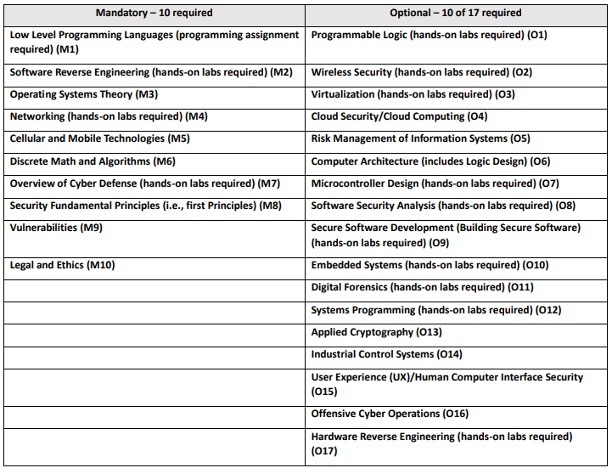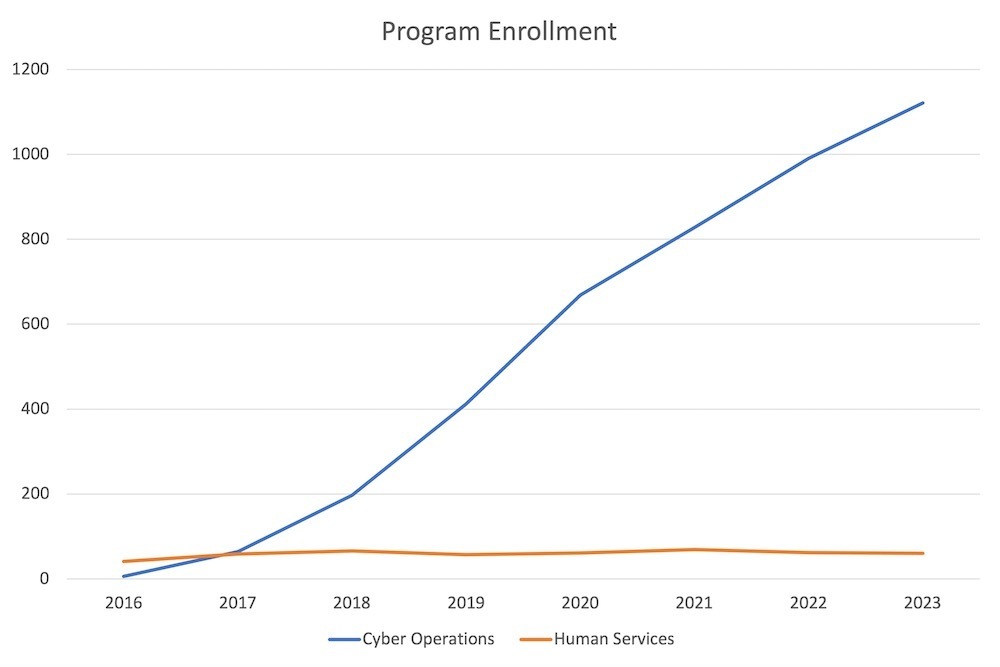Abstract
Accreditation is one mechanism to review the quality of higher education institutions and programs. Having accredited programs can differentiate programs and provide opportunities to increase student enrollment and signify program excellence. Additionally, accreditation can be a forcing function for continuous improvement and program assessment. This paper provides a brief review of the accreditation process for two programs at a college within a Tier-1 Research Institution. Additionally, it provides a brief overview of the results experienced after accreditation and the associated benefits of having accredited programs.
Introduction
In an era where new colleges and programs seem to pop up every other week, having something that differentiates one college or program from others is vital. Accreditation is one such mechanism to differentiate programs. The Council for Higher Education Accreditation (CHEA) defines accreditation as a “review of the quality of higher education institutions and programs (CHEA, 2023)”. There are 19 recognized accrediting organizations at the institution level and approximately 60 programmatic accrediting organizations (CHEA, 2023). The benefits of accreditation include the ability to communicate a commitment to quality; strengthens the focus on student performance data; supports intentional, innovative, and reflective design; increases program visibility; and provides faculty a voice in the program (NAEYC, 2023). More importantly, accreditation, guided by industry standards, can act as an external stamp of approval to set a program apart from similar programs. An accreditation process provides a way of certifying that a program has met established criteria and standards, ensuring it has met acceptable levels of quality within its industry. This paper will review accreditation and the accreditation process for a Human Services and a Cybersecurity program at a Tier-1 Research Institution, provide statistics on program growth and opportunities, and provide recommendations for pursuing accreditation for programs.
Accreditation
The University of Arizona’s (UA) College of Applied Science and Technology (CAST) has pursued accreditation for two of its programs; namely, Cyber Operations and Human Services. These programs represent the highly technical with Cyber Operations to the community engaged and social science with Human Services. Their respective accreditation processes vary greatly as do the outcomes of the process.
Cyber Operations
Although the University of Arizona maintains the three accreditations in Cyber Defense (2009), Cyber Operations (2018), and Cyber Research (2017) from the National Centers for Academic Excellence in Cybersecurity (NCAE-C) program, the Cyber Operations program will be the focus of this paper. The Cyber Operations program began in 2016 coinciding with the application process for NCAE-C designation. The program was evaluated twice before receiving its designation in 2018 as one of 24 schools in the nation to receive the Cyber Operations designation.
The National Centers of Academic Excellence in Cybersecurity (NCAE-C) program was established in 1999 to evaluate curriculum and program requirements and address the lack of qualified cybersecurity professionals in the workplace. NCAE-C aims to create and manage a collaborative cybersecurity education program with community colleges, colleges, and universities that establish standards for cybersecurity curriculum and academic excellence, includes competency development among students and faculty, values community outreach and leadership in professional development, integrates cybersecurity practice within the institution across academic disciplines, and actively engages in solutions to challenges facing cybersecurity education (NCAE-C, 2023). The accreditation process consists of two primary aspects: Program of Study (PoS) Evaluation and the CAE Designation. The PoS Evaluation consists of eight steps which takes approximately 12 – 14 weeks. This process reviews curriculum, student related information, faculty profiles and qualifications, and continuous improvement information (Hamilton, 2022). Once the program of study is positively evaluated, the institution can apply for a designation. The criteria necessary for designation are accreditation, institutional commitment, evidence of sound cybersecurity posture and plan, established “Center” for cybersecurity, affirmation of the NCAE-C core values and guiding principles, sustainability, professional development, and commitment to support the CAE Program (Hamilton, 2022). NCAE-C identifies 10 mandatory Knowledge Units (KU) and 17 optional KUs (Image 1) of which programs must meet at least four.

The timeline for the designation process has changed recently; however, the process can take from six months to two years. For CAST, once the PoS was positively evaluated and the designation documents submitted, site visits from the accreditation team were conducted. Site visits lasted two days and included a review of all courses, interviews with faculty, research discussions, and a review of support systems within the college.
Human Services Program
Similarly, CAST’s undergraduate human services program is top notch and one of quality. CAST started the Council for Standards in Human Service Education (CSHSE) accreditation process during the spring 2020 semester culminating with it being CSHSE’s first fully online accredited program in the nation during spring 2022.
CSHSE, established in 1979, provides direction and guidance to education and training institutions in the mental health and human services industries – ultimately standardizing and providing a national accreditation process in this environment. The overall application process was rigorous, challenging, and time consuming but rewarding once successfully completed. From start to finish, the process took nearly two years for our program, with many long hours for our program director and human services faculty to work on it. The CSHSE’s accreditation process is a 12-step process that starts with the initial application and can go no longer than two years from the start of the initial application submission. Once the application was submitted, the two-year period started. One of the most time-consuming steps of the process was the required self-study, which can take between 3 to 6 months to write if you have no curriculum modifications. After the self-study was submitted and CSHSE evaluators reported sufficient information to move forward, and a two-day site visit was set up. During the site visit, multiple meetings (nine different meetings) took place with the following groups: CAST Administration, faculty, advisory board, library and technical support staff, students/graduates, and fieldwork supervisors. Once the site visit was completed, a final decision on accreditation was obtained within a month. The final decision letter included strengths of the program, recommendations to strengthen the program, and a reaccreditation date set for spring 2027.
Results and Benefits
The amount of effort required to obtain these accreditations were extensive. Since the Human Services program was recently approved, there is limited data on the impacts accreditation have had on the program. The Cyber Operations designation provides nearly five years of data and outcomes which will be used to compare and contrast with Human Services in the future. The results will focus on program growth and increased opportunities.
The Cyber Operations program began with six declared majors in 2016 and currently has over 1100 declared majors (Image 2). At the time of designation, the NCAE-C program office estimated that designated schools receive a 100-200% increase year over year for the first three years. The enrollment numbers for Human Services are provided as an established baseline to track enrollment growth and comparison post accreditation. Enrollment has been consistent over the same time period with approximately 60 students.

Image 2 – CAST Program Enrollment
There are many opportunities and benefits associated with accreditation. Depending on the accreditation body, programs may get access to professional networks, professional development opportunities, grants, and scholarship opportunities to name a few. For example, NCAE-C utilizes the Cyber Scholarship Program (CySP) as a recruitment and retention tool to attract top talent to support Department of Defense (DoD) organizations (Clark, 2022). This scholarship provides students with full tuition and fees, a $25,000 stipend, guaranteed employment at a DoD organization post-graduation, and conference travel funds. Additionally, institutions can apply for capacity building grants each year to support faculty and program development. To date, 26 students have received the scholarship and the program has received over $4 million in total funding to support students and the program. Additionally, accreditation and associated membership provides access to additional resources such as self-study materials (CSHSE, 2023), faculty development (CAE Workshops, 2023), and curricular materials such as those found with CLARK (CLARK, 2023) and CARD (CARD, 2023). Finally, accreditation provides access to marketing materials, outreach networks, and methods of posting job ads to hire faculty. Accredited programs are listed on the national websites and added to listservs to build community and networking opportunities. Logos can be used to develop program promotional and marketing materials. These examples demonstrate a few potential impacts and benefits of accreditation from our experience.
Conclusion
While the overall accreditation process was rigorous, challenging, and time consuming, it was well worth it. Accreditation processes vary within accrediting bodies and the specific program requirements. The Cyber Operations program accreditation was broadly broken down into two stages with multiple sub-steps in each stage. The overall accreditation process can take from six months to two years. The CSHSE process included 12 steps and must be completed within two years of initial application. Accreditation generally provides benefits including the ability to communicate a commitment to quality; strengthens the focus on student performance data; supports intentional, innovative, and reflective design; increases program visibility. CAST’s accreditation experience with their cyber operations and human services programs reflected these benefits in the exponential enrollment growth, millions of dollars in grant and scholarship funding, and access to training, professional development, and curriculum. These results demonstrate how accreditation can drive program enrollment and signify program excellence.
Three recommendations are provided before pursuing accreditation. First, identify whether your program has an associated accreditation process or accrediting body. Second, identify the return on investment for pursuing accreditation. It is important to recognize that exponential growth can introduce problems such as hiring qualified faculty to support program growth. Finally, fully understand the requirements post-accreditation. There can be extensive data collection and reporting requirements.
References:
CAE Workshops (2023). Faculty development. CAE in Cybersecurity Community. https://www.caecommunity.org/events/faculty-development-palm-desert.
CARD (2023). Cybersecurity education resource directory. CAE Resource Directory (CARD). https://caeresource.directory/home.
Council for Higher Education Accreditation (CHEA). (2023). Accreditation & recognition: About accreditation. https://www.chea.org/about-accreditation.
CLARK (2023). Cybersecurity labs and resource knowledge-base (CLARK). https://www.clark.center/home.
Clark, L. (2022). National Centers of Academic Excellence in Cybersecurity Program Guide 2022 Edition. Centers of Academic Excellence in Cybersecurity Community. https://www.caecommunity.org/sites/default/files/2022-06/CAE_Book_6.0_Web.pdf.
Council for Standards in Human Services Education (CSHSE). (2022). CSHSE member handbook: Self-study and accreditation guide. https://www.cshse.org
Council for Standards in Human Services Education (CSHSE). (2023, March 10). Membership Resources. https://cshse.org/login/
Hamilton, D. and Hamman, S. (2022). National Centers of Academic Excellence in Cybersecurity (NCAE-C) 2022 Designation Requirements and Applications Process for CAE Cyber Operations (CAE-CO). Application Process and Adjudication Working Group and Cyber Operations Working Group. https://dl.dod.cyber.mil/wp-content/uploads/cae/pdf/unclass_cae-cyber-operations-program-guidance.pdf.
National Security Agency / Central Security Service (2023, March 10). National centers of academic excellence in cybersecurity. https://www.nsa.gov/Academics/Centers-of-Academic-Excellence/.

